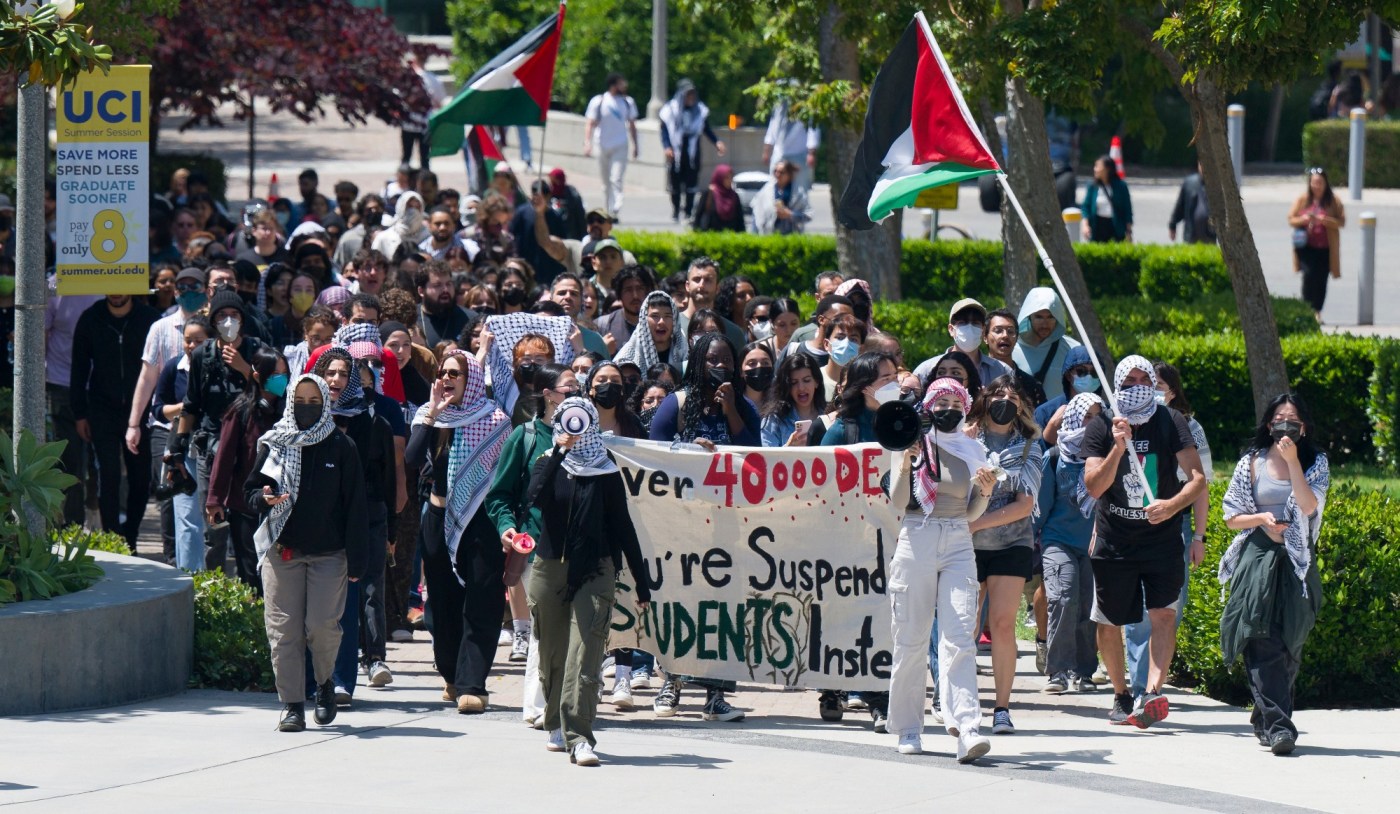As a new term begins at UC Irvine, unease about the Israel-Hamas war lingers and threatens a new wave of campus protests across the University of California system.
In light of protests last spring, UC administrators worked over the summer to clarify and consolidate campus policies on free expression. In August, UC President Michael Drake redoubled the university system’s commitment to “nurture free expression,” but he also sent a strong message that unlawful protests will not be tolerated and anti-camping policies will be enforced this fall.
Last week, demonstrators at UCLA disrupted a regents committee as it moved to discuss the routine purchase of less-than-lethal weapons and ammunition by campus police departments. Regent Jay Sures called on UC police to declare an unlawful assembly and moved the committee to an adjoining room. Protestors complied with police demands to leave the area within three minutes, Calmatters reported.
Drake directed each UC campus to distill its existing protest and demonstration policies into a single document or webpage prior to the fall term.
UCI’s policies on these matters are now laid out at uci.edu/campus-climate.
UCI spokesperson Mike Uhlenkamp said the university’s policies were in place prior to protestors building a makeshift encampment last spring outside of the Physical Sciences Lecture Hall.
That encampment stood for more than two weeks until a small group barricaded themselves inside the hall on May 15, prompting a call for assistance from more than a dozen local police agencies. Officers in riot gear declared an unlawful assembly and moved protestors out of the area, vestiges of the encampment being cleared as they went.
Forty-seven people were arrested for trespassing or failure to disperse after a direct police order. Orange County District Attorney Todd Spitzer announced misdemeanor charges against 10 of them last week, including two faculty members and four students, saying his office continues to review the cases of the others arrested May 15.
In response to Drake’s letter, Students for Justice in Palestine at UCI and other campuses shared an Instagram post with the message “I ain’t reading all that. Free Palestine,” emblazoned over Drake’s text.
But leaders of the student group who served as spokespeople during the encampment did not respond to requests for comments about what plans they may have with the new quarter starting.
Uhlenkamp said UCI leadership did not change move-in week activities relative to previous years, but he would not comment on whether the university has added security measures this year.
“As a matter of practice, the university will not publicly discuss security protocols,” he said. “What I can share is that we are prepared for and incredibly excited to welcome new and returning students to campus.
“UC Irvine is committed to fostering a welcome learning environment for our students,” he said.
Several UCI students suspended indefinitely after their involvement in pro-Palestine protests last spring sued the UC regents and UCI Chancellor Howard Gillman late last month in state court, saying the suspensions “constitute a clear violation of the university’s own rules and the minimum standards of due process applicable to public institutions.”
The students asked the court to lift the suspensions.
Related Articles
UCI fills dorms over move-in weekend
UC Irvine announces most successful fundraising year on record
UCI Health Kidney Transplant Program marks 200 transplants for year
UCI Medical School program addresses shortage of Latino physicians in California
UC president tells heads of UCLA, other campuses to enforce encampment ban
Uhlenkamp said state and federal privacy laws prevent the university from commenting on the number of students who continue to face suspensions related to protest activities or the university’s timeline on the internal review of those cases.
Gillman acknowledged tensions in a welcome message to the campus community this week ahead of the new academic year.
“By now you have also heard about the various messages regarding our commitment to free expression and our policies that govern time, place, and manner regulations,” he wrote. “I am sure you understand the reasons for these messages.”
“As we begin this year, we find ourselves in a world marked by terrible and even horrific circumstances and in a country where domestic politics remain bitterly divided,” he added. “We cannot, and should not, be unaffected by these conditions or remain silent about them. Have your say. Advocate for what is important to you. But while doing so let us also keep in mind the primary and most fundamental reason we have gathered together to be part of this scholarly community: to serve humankind by pursuing, achieving, and sharing deeper knowledge.”





